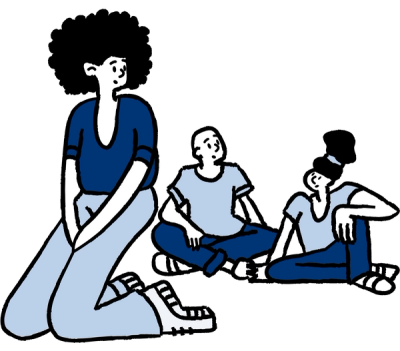Is your device making you lonely?
Devices and social media are often an integral part of our day-to-day life. They’re incredibly powerful tools, and like any tool, the way we use them can lead to both good and bad consequences.
On the one hand, they can keep us connected with the people and the world around us, fostering and strengthening our connections and relationships. We can zoom our Nani in India, share a cat video with our mates, and learn how to cook a strudel from a stranger, all without ever having to leave our house.
But on the other hand, our devices can make us feel lonely. Ultimately, interacting with a phone, tablet or computer just isn’t the same as genuine human connection. Online behaviours can range from having unintended consequences that end up making us feel worse, to being deliberately designed to make us addicted to these screens. Let’s explore some ways our devices can make us feel lonely.
Why technology can make us feel lonely
There are several reasons why time online can lead to feelings of loneliness. You can find some of the main reasons below. Do any of these ring true for you?
- Social media can skew your sense of reality and expectations of yourself because it only presents you with other people’s best moments – the good hair days, the happy holiday snaps, the cool parties with friends. These are highly curated versions of other people's lives that are vastly different from their whole experience of real life. But seeing other people’s best moments can make you compare their stylised moments with your seemingly boring, imperfect life – which can conjure up feelings of inadequacy, self-judgement, dissatisfaction and increased isolation.
- Texting, emailing and messaging lack emotional cues that come with face-to-face communication, making it harder to fully connect with others
- It’s often our imperfections, flaws and vulnerability that help us form authentic and deep relationships with others, but we often present a stylised version of ourselves online rather than our authentic self
- Dating apps can be a great way to meet new people, but swiping through countless profiles can be overwhelming and impersonal, and the constant rejection that often comes with online dating can lead to feelings of inadequacy and loneliness
- Technology is made up of algorithms designed to favour certain types of content. It often prioritises ‘popular’, ‘good-looking’ and ‘successful’ people over authentic, unfiltered content you might be more likely to connect to. The algorithms are also made to keep showing you what you’ve viewed so far, which might negatively impact your mental health. For example, if you’ve recently viewed depressing content, the algorithm will keep recommending similar depressing content, which can make you feel even more depressed.
- Many online experiences manipulate human insecurities, such as the desire to connect, be popular, liked and fit in. Imagine if collecting stamps was one of your hobbies. You might find it incredibly rewarding even if no one else from your circle shares your hobby. While social media can help you connect with other stamp collectors, it can also make you feel disconnected from society. If you post a photo of your stamp collection on social media and it doesn’t get many ‘likes’ - what message is that subconsciously sending your mind?
“When I don’t have reception, there’s a weird part of me that’s secretly relieved to get a break from my phone, from how it makes me feel.”
How you connect matters
But changing how we use our devices can make a big difference to how we feel. Take a moment to reflect on how you use technology, and if any of the below resonate for you.
Things that might increase feelings of loneliness include:
- Turning to social media to pass time when you feel bored or restless, or to stay ‘updated’ on what other people are doing
- Following strangers or personalities you don’t know
- Using technology as an escape from other difficult or painful feelings
- Using social media to replace time with people face-to-face in the physical world
- Going online to argue with others, cyberbully or cause conflict
On the other hand, online interactions that can boost meaningful connections include:
- Connecting with people you know or have things in common with
- Interactions with people who live further away or people that may be harder to connect with in the real world i.e. online gaming friends or people you’ve met via interest groups
- Curating your online life in an authentic way. This means being real about who you are and how you’re feeling, not showing an idealised version of you and your life. Sharing your values, experiences and stories can help others relate to you and help you build authentic connections with others.
Our natural human desire to feel popular and fit in means we may show up online in a highly curated, performative way. In any environment – whether online or not, we may wear a mask of who we want to be and how we want to be perceived by others – but the problem is, it’s often not authentic to who we really are. This tends to create a disconnection between our authentic self and our masked self, which can make us feel lonely and disconnected from others.
Meaning and connection come from feeling accepted as our authentic, vulnerable, imperfect selves and seeing that everyone else is just as vulnerable and imperfect as we are. Think about what’s made you feel connected to your best mate, or perhaps an expert in your field – it’s likely to have been the time your mate dropped the act and was honest about how they are feeling, or maybe it was when that well-respected expert fumbled their palm cards during a presentation – these things are humanising and what connects us to one another.
Tips to improve your relationship with technology
There are things you can do to reduce the control your devices have over your mood and whether you feel more or less lonely after using them.
- Refresh your home screen
Take a look at your phone’s home screen, and what apps you reach for most. How do they make you feel? Consider deleting or moving the ones that might be fueling negative feelings, and bringing some others that are more positive onto your home screen.
- Set healthy limits
- Create accountability
- Go grayscale
- Curate who you'll follow
- Create 'powerful pauses'
In addition to these tips, there are also some factors to remember if you’re ever hard on yourself about having a digital dependency.
Firstly, that technology is probably central to your life, often your work. Going cold turkey isn't always an option, but even if it makes you feel negatively, you can find ways to make tech work better for you.
Secondly, your relationship to your devices isn’t simply a matter of self-control. Technology is often designed to be addictive, it works by tricking the reward system of your brain to keep you coming back for more, which makes it more difficult to be disciplined over your devices than you may think.
The tips above can help you take back some sense of control and develop meaningful connections so you can have a more rewarding experience online.





